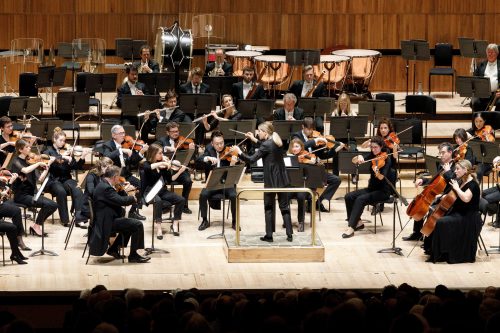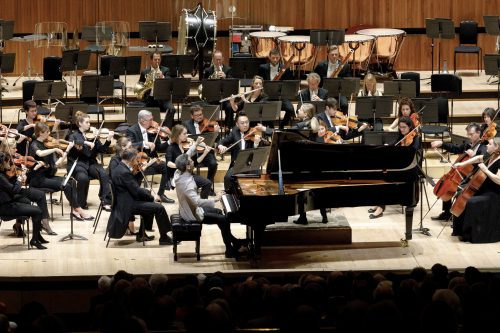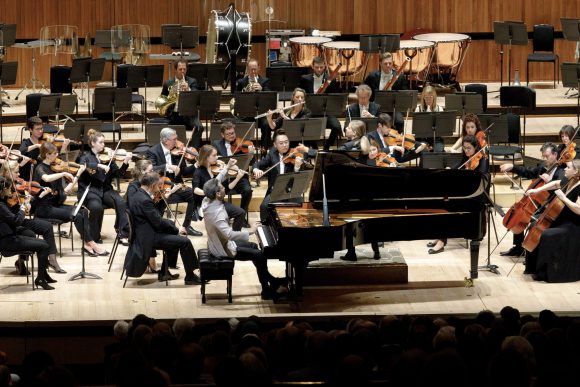 United Kingdom Beethoven, Shostakovich: Jonathan Biss (piano), London Philharmonic Orchestra / Karina Canellakis (conductor). Royal Festival Hall, London 28.10.2023. (JR)
United Kingdom Beethoven, Shostakovich: Jonathan Biss (piano), London Philharmonic Orchestra / Karina Canellakis (conductor). Royal Festival Hall, London 28.10.2023. (JR)

Beethoven – Overture, The Creatures of Prometheus Op. 43; Piano Concerto No.2, Op.19
Shostakovich – Symphony No.8, Op.65
In 1801 the Court in Vienna commissioned the young Beethoven to write music for a ballet entitled The Creatures of Prometheus. He composed thirty-two short pieces and an overture, only the Overture is now regularly performed. Canellakis and the orchestra clearly enjoyed this sparkling curtain-raiser; after a few sudden off-key wake-up calls, the strings scampered with precision, the woodwind sauntered effortlessly – this was a delicious sweetmeat.
Beethoven’s Second Piano Concerto was, chronologically speaking, probably his First and it certainly echoes Mozart in style rather than the later, more heroic Beethoven. American pianist Jonathan Biss is not a household name on the London concert stage; he is the son of violinist Miriam Fried and conductor, violist and violinist Paul Biss; and the grandson of American cellist Raya Garbousova, for whom Samuel Barber wrote his Cello Concerto. Biss has recorded (over a space of nine years) all 32 Beethoven’s piano sonatas and has been heralded by the Chicago Tribune as ‘one of today’s foremost Beethoven exponents’. I would endorse that commendation after hearing Biss play the Second Concerto. Biss has written a book entitled Unquiet: My life with Beethoven in which he states that he loves Beethoven’s music above most things. He expounds on the spellbinding hold the classical figure and his work possesses over him.

Biss was clearly attuned with every phrase of the concerto, every note; he guided us elegantly, intelligently and persuasively through the work which some might consider lightweight in comparison with the last three piano concertos which Beethoven composed later in life. Canellakis accompanied with spirited verve and empathy with the soloist. In the Adagio the audience appeared to have been struck dumb by the sheer serenity and beauty of Biss’s playing. The last movement, a fast Rondo: molto allegro showed off Biss’s virtuosic skills and the audience went to the interval in high spirits after this and his encore, a ravishing, sublimely rendered slow movement from the Pathétique Sonata. We all wished Biss could have continued with more from it; though I am sure we will hear Biss on this side of the pond again soon with hopefully more Beethoven from him.
Allow me to digress ever so slightly: I heard my very first Shostakovich symphony in Exeter University Hall in the very early 1970s. Maxim Shostakovich was scheduled to conduct the visiting Bournemouth Symphony Orchestra and present the UK premiere of his father’s 15th Symphony. It was decided to move that premiere to London and instead we heard the mighty Fifth Symphony. I rushed to the record store next day. Ten years later it was Bernard Haitink and the London Philharmonic who brought many of Shostakovich’s symphonies to the Royal Festival Hall and his music gained a much wider audience. Canellakis has Greek and Russian ancestors and her affinity with Shostakovich was evident in this towering performance. This is one of Shostakovich’s ‘War’ symphonies. As the orchestra’s cymbals crashed and the brass and timpani guns pounded, it was hard not to reflect on events unfolding in Israel and the Ukraine: whilst the Royal Festival Hall organ appeared bathed in Soviet red.
In the long opening first movement (Adagio – Allegro non troppo) one could not fail to be impressed by the solo piccolo (Stewart McIlwham); then it was the turn of Sue Böhling to contribute a heartbreakingly mournful cor anglais solo. This was, however, undoubtedly a team effort; the trio of trombones thrilled, the trumpets were faultless led by Paul Beniston; Kristina Blaumane (cello) and Leader Pieter Schoeman played delicate solos; the woodwind shrieked; the percussion section lambasted us with decibels.
For some time after Covid had subsided and live concerts returned, the coughers and sneezers seem to have been kept in abeyance, though they are, sadly, coming back it seems. This is a symphony where the effect can be spoiled – almost so in this performance – by unrestrained coughs and mobile telephone jingles and alarms. Haitink once memorably held up a handkerchief during the final bars of this great work, considered by many to be one of his finest. What a pity too that some premature applauders just could not wait for the music to be impressed on one’s senses. Even with all these complaints, I shall treasure a concert that will certainly be a highlight of my concert year – a shattering performance of one of Shostakovich’s finest symphonies. I do hope Canellakis returns next season with another Shostakovich symphony.
John Rhodes
